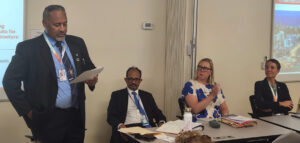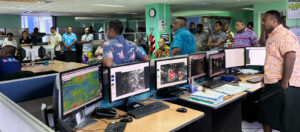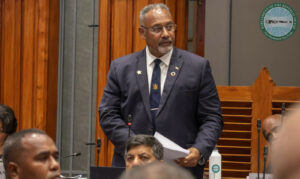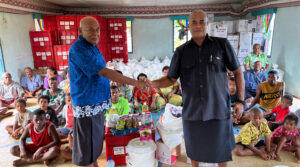
Caption: Minister for Rural and Maritime Development and Disaster Management Hon. Sakiasi Ditoka with the United Nations Resident Coordinator to the Pacific H.E. Dirk Wagener and members of the United States Congress at the NDMO warehouse in Walu Bay, Suva last month.
SUVA – The visitation by a team from the United States Congress serves as a powerful symbol of the tangible partnerships and collaborative efforts that are at the core of our collective mission, says Minister for Rural and Maritime Development and Disaster Management Hon. Sakiasi Ditoka.
In welcoming the US delegation at the National Disaster Management Office (NDMO) warehouse in Walu Bay, Suva last month, Hon. Ditoka highlighted that while the visit marked a significant milestone for Fiji, it also provided a timely opportunity for the Congress members to witness firsthand the preparations and resources in place to support disaster preparedness and response efforts in Fiji. The visit, he added, would also enable the visiting delegation to gain invaluable insights into the challenges and opportunities that lay ahead for stakeholders working in the disaster space in Fiji.
“In recent months, our region has confronted formidable challenges. Fiji has grappled with devastating floods, while the Federated States of Micronesia and the Republic of the Marshall Islands have endured severe droughts. Papua New Guinea has faced the onslaught of flooding, landslides, and earthquakes, and Vanuatu continues its arduous recovery from the dual cyclones Judy and Kevin last year. At the heart of our efforts lies the Sustainable Development Goals, a universal call to action to end poverty, protect the planet, and ensure prosperity for all. Among these goals, SDG 17 stands out as a beacon of hope, emphasising the importance of partnerships for the achievement of all other goals,” Hon. Ditoka stated.
“Within the realm of disaster management, the significance of partnerships cannot be overstated. Disasters, whether they be natural or man-made, often transcend borders and require a coordinated response that spans sectors and disciplines. By fostering partnerships at local, national, and international levels, we can enhance our collective resilience and capacity to mitigate the impact of disasters. These you will witness today, as not only our UN Partners are here but also our NGOs and CSOs. Collaboration between Fiji Government, development partners like the US government, and the UN is paramount. It underpins localized initiatives and programs for the benefit for all Fijians. A notable example is the collaboration between the World Food Programme (WFP) and the Fiji NDMO to enhance institutional capacities and systems in supply chain logistics and emergency telecommunications. Through this partnership, resources and expertise are pooled to bolster Fiji’s readiness to prepare for, respond to, and recover from disasters and shocks.”
An illustrative instance of this collaboration, he highlighted, was the World Food Programme’s (WFP’s) assistance in training the inaugural National Emergency Response Team for Fiji, ensuring they possessed the necessary skills and knowledge to effectively coordinate and execute emergency responses.
“This resonates with the US government’s efforts to strengthen local, national, and regional disaster preparedness and capacity-building interventions within the Pacific,” he added.
During their visit to the NDMO warehouse, members of the US Congress also had the opportunity to meet and be briefed by civil society organisations (CSOs), and partners working in Fiji’s disaster space.
Meanwhile, the US Congress team’s visit to Fiji was made possible through the UN Foundation (UNF), a public charity that links the UN’s work with others around the world, mobilizing the energy and expertise of policymakers, businesses, and non-government organisations (NGOs) to help the UN tackle global challenges. As part of its core mission, the UNF regularly organises privately funded learning trips that allow U.S. Members of Congress and their staff the opportunity to see the UN’s work in person and ask questions about a wide range of policy initiatives. Over the last 10 years, more than 250 congressional staff and dozens of Members of Congress have participated in these programmes, traveling to Senegal, South Sudan, Mozambique, Tanzania, Mali, Thailand, Bangladesh, Jordan, Lebanon, and more. These experiences help transform policymakers into vocal champions that better understand how U.S. investments in the UN System achieve shared development, health, and security objectives.
The delegation also visited Tonga and Tuvalu to learn more about how the UN was helping Small Island Developing States (SIDS) navigate climate change impacts on nutrition and health outcomes in the Pacific.

Caption: Minister for Rural and Maritime Development and Disaster Management Hon. Sakiasi Ditoka with the United Nations Resident Coordinator to the Pacific H.E. Dirk Wagener, members of the United States Congress and staff members of the NDMO and representatives of various CSOs and donor partners at the NDMO warehouse in Walu Bay, Suva last month.





